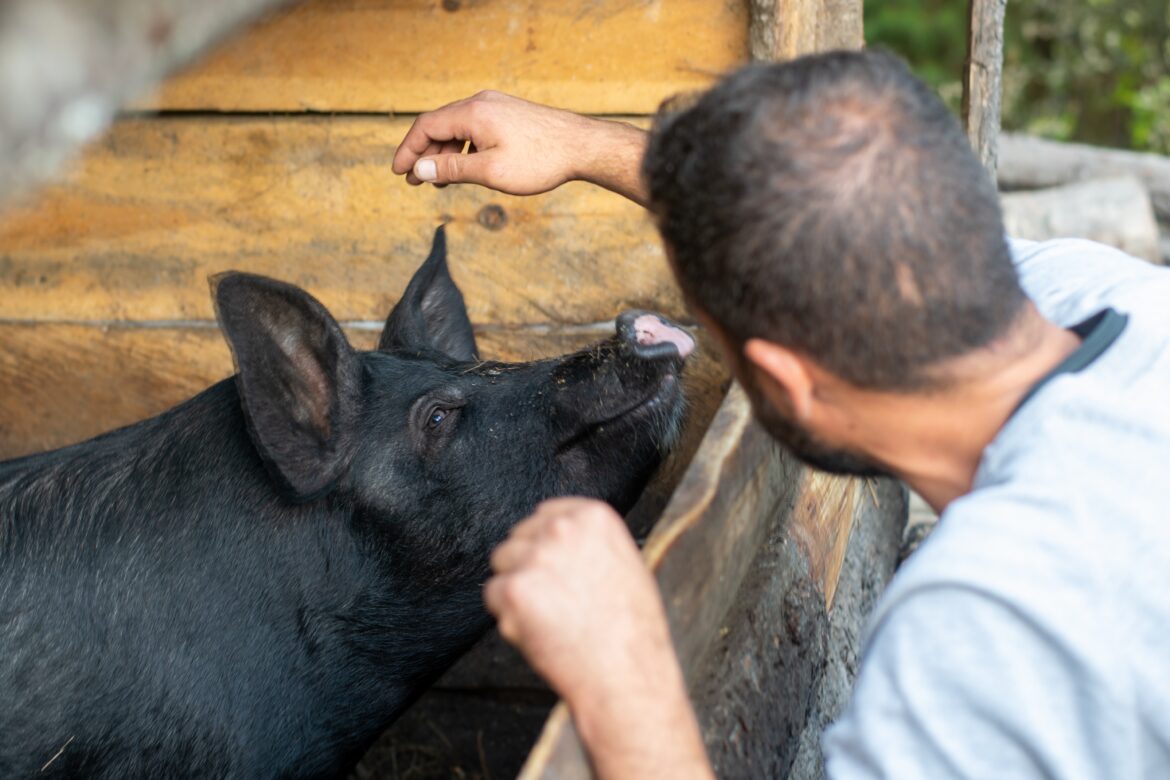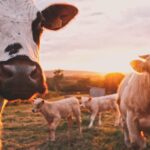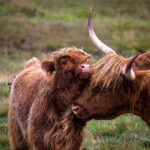In this extended article, Dr Lisa Warden explores the Biblical mandate to care for God’s creatures, our contemporary treatment of animals and whether Christians may be called to challenge the status quo.
Some 3,000 years ago, on the occasion of the dedication of the first temple in Jerusalem, God appeared to Solomon with a word of advice about how to respond in the event of plagues and afflictions: “When I shut up the heavens so that there is no rain, or command the locust to devour the land, or send pestilence among my people, if my people who are called by my name humble themselves, and pray and seek my face and turn from their wicked ways, then I will hear from heaven and will forgive their sin and heal their land” (2 Chronicles 7.13-14).
COVID-19 moved Christians around the world to follow God’s advice to Solomon. As the novel virus grew into a pandemic and nations went into lockdown, many believers responded with times of prayer, fasting, and repentance. Second Chronicles 7.14 echoed like a refrain on Zoom prayer sessions and Facebook live feeds across the globe. Like Ezra and Nehemiah in Old Testament times, the faithful counted themselves among the sinners and repented—not only of their own individual sins, but those of their respective societies, including pride, greed, arrogance, racism, violence, corruption, and much else. Absent from the list of transgressions, however, was any mention of that which appeared to have precipitated the pandemic: cruelty to animals. Should this issue be of any concern to Christians, and if so, why?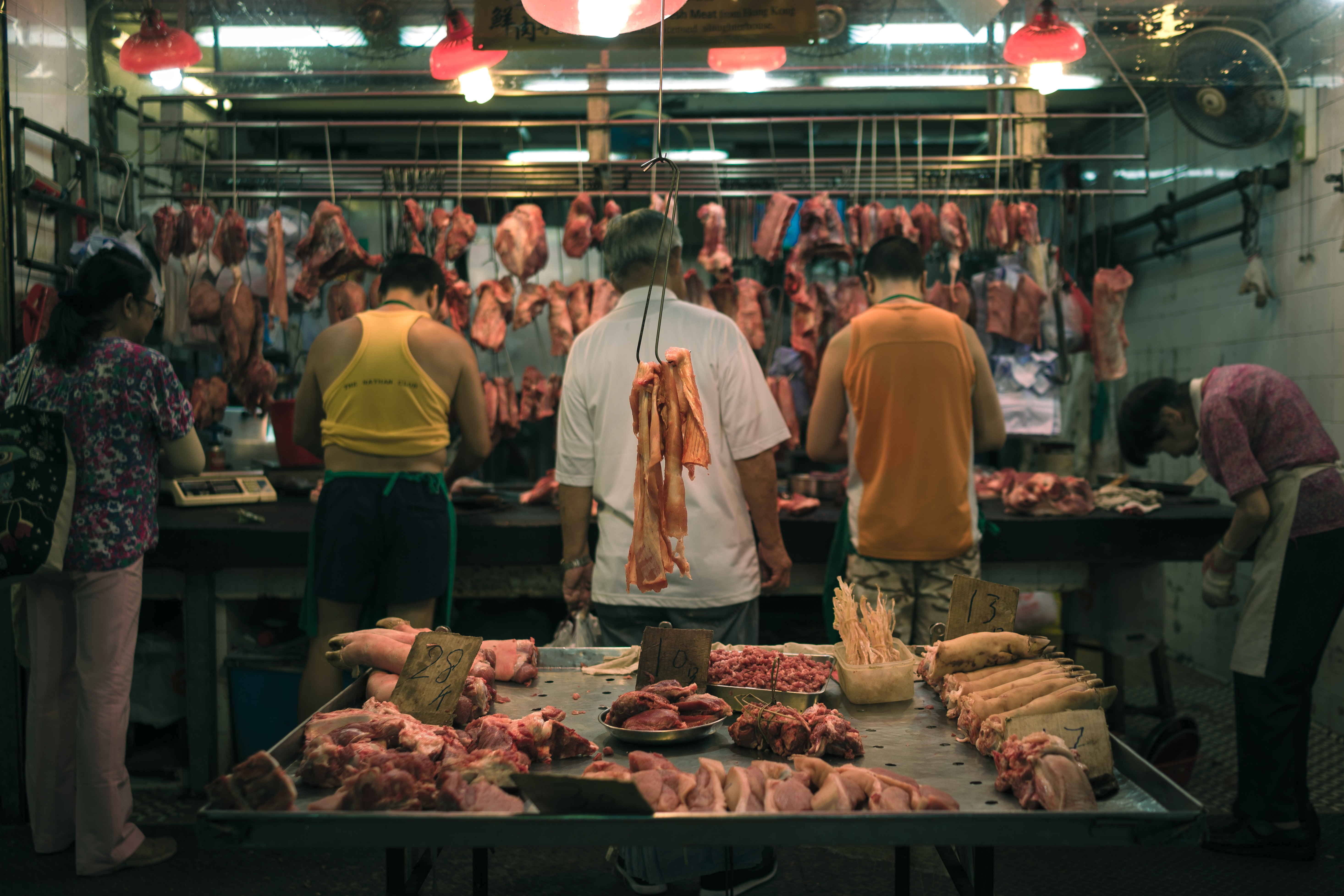
The origin of the coronavirus that caused COVID-19 remains contested. One hypothesis is that it jumped to humans from its animal hosts at a wildlife market in Wuhan, China. The conditions at animal markets—terrified raccoons, pangolins, foxes, deer, rabbits, dogs, cats, and all manner of other creatures, crammed in cages one upon the other, slaughtered in full view and earshot of each other—are shocking. The cruelty is self-evident. Confronted with such scenes, one hardly needs an explicit prohibition against cruelty in the Scriptures to know that brutal treatment of animals is wrong. In a sobering analysis in National Review, Matthew Scully, author of Dominion: The Power of Man, the Suffering of Animals, and the Call to Mercy, was blunt: “the plague began with savage cruelty to animals.” The source of the pandemic, he wrote, was none other than “willfulness and hardness of heart” in humans’ treatment of animals.
The other possibility is that the virus emerged as the result of a leak from one of the labs at which gain-of-function research on coronaviruses was taking place. If so, the implications with respect to our treatment of animals are no less sobering. Such research does not occur without intentional systematic animal cruelty. The animals are kept in unnatural conditions, subjected to genetic modifications, deliberately sickened, and then killed. Over 100 million animals annually are used in research and testing.
The biblical mandate to care for animals
What a contrast the brutality of the wildlife markets strikes with the tranquility and interspecies fellowship one imagines in the Garden of Eden: Adam taking an afternoon siesta, his head nestled comfortably in the lush mane of his feline companion, Leo the lion, who purrs and kneads the green meadow in which they lay. Nearby, their friends, the calves and wolves, frolic together amid the wildflowers, while a lamb and a panther drink side-by-side from a crystalline stream. Such is the vision, in the book of Genesis, of life before the Fall, in which all creatures of flesh—human and animal alike—coexist in peace in a flourishing creation. That peace is ruptured by the Fall, which breaks the relationship between humans and God, and among humans and the animals and the earth, and ushers in a rapport characterized by violence, exploitation, death, and disease—not to mention animal cruelty at wildlife markets and animal experimentation labs.
The aim of the redemptive plan is the restoration of all things, the mending of that which is broken, and the birthing of a renewed creation, in which “nothing shall hurt or destroy” (Isaiah 11.9). The renewed “peaceable kingdom,” described in the book of Isaiah, resembles, in its kinship between humans and animals, the interspecies harmony of the Garden of Eden. For Christians, the imperative is to usher in that vision now.
The Scriptures, in fact, are replete with often-overlooked passages that reveal God’s concern for animals and how we treat them. It is not disputed that the Christian faith demands humans be merciful to one another. Less frequently acknowledged is that our faith mandates mercy to animals as well. “Whoever is righteous has regard for the life of his beast, but the mercy of the wicked is cruel,” reads Proverbs 12.10. “For every beast of the forest is mine, the cattle on a thousand hills. I know all the birds of the hills, and all that moves in the field is mine” (Psalm 50.10-11). If all animals belong to God, then surely the way we treat them is a subject of concern to Him. The Bible teaches that treating animals well constitutes an aspect of righteousness. Foreshadowing Christ’s call to love our enemies, Moses instructs the Israelites to extend mercy not only to their own animals, but also to the animals of their enemies: “If you see the donkey of one who hates you lying down under its burden, you shall refrain from leaving him with it; you shall rescue it with him” (Exodus 23.4-5). Clearly, the treatment of animals is to be a subject of serious concern for Christians.
Numerous passages in the Scriptures attest to God’s concern for animals and the esteem in which He holds them. God saves not just a human remnant—Noah and his family—from destruction in the Flood, but a vast animal remnant as well. And among the animals he saves—like giraffes, zebras, butterflies, pangolins, hyenas, and elephants—are countless species not used by humans for food, sacrifice, or labour, indicating that their worth to the Creator is independent of their usefulness to humans. God’s affection for His nonhuman creatures is evident in His words to Jonah. God explains to the disgruntled prophet that He longed for the wicked Ninevites to repent, not only so the humans would be spared destruction, but also for the sake of the many animals there (Jonah 4.11).

God’s regard for animals extends to the point of making legal agreements with them. In Genesis 9, after the Flood, God makes a covenant with “all flesh,” human and nonhuman: “Behold, I establish my covenant with you and your offspring after you, and with every living creature that is with you, the birds, the livestock, and every beast of the earth with you, as many as came out of the ark; it is for every beast of the earth” (Genesis 9.9-10). God makes another covenant with “the beasts of the field, the birds of the heavens, and the creeping things of the ground” in the second chapter of Hosea (Hosea 2.18). If animals are important enough to God to merit direct legal agreements with Him, then we who seek to walk in His ways would do well to pay heed to how He wants us to treat them.
Cruelty to animals is explicitly denounced in the Scriptures. The angel of the Lord himself comes down to rebuke Balaam for beating his donkey (Numbers 22.22-33). In the New Testament, Jesus affirms that we are not to limit our mercy and compassion to our own species. “Which of you, having a son or an ox that has fallen into a well on a Sabbath day, will not immediately pull him out?” asks Jesus (Luke 14.5). Even Sabbath rest is not limited to humans: “[T]he seventh day is a sabbath to the Lord your God. On it you shall not do any work, neither you, nor your son or daughter, nor your male or female servant, nor your animals, nor any foreigner residing in your towns” (Exodus 20.10). Acts of compassion and mercy, whether to humans or animals, do not contravene the Sabbath law; they fulfill it. “A reading of the Scripture that is attentive to animals,” writes author and theologian Sarah Withrow King, “shows that humans and animals are both created by God, worship God”—yes, animals do worship God! Psalm 148 provides just one example—“and are provided for by God.” She continues, “[H]umans are made in the image of God and given a particular role in that image; the whole (broken) world is in the process of being reconciled to God through Jesus Christ; and the vision of the promised kingdom is marked by peace between and flourishing of all species.”
Contrary to common opinion among Christians, God did not make animals for the purpose of providing humans with a food source. Various commentators identify that assumption as incorrect. Theologian David Clough, professor of theological ethics and author of On Animals, a two-volume work of systematic theology, explains, “The idea that God made other animals for humans to eat is widespread among Christians, but is easily contradicted by an attentive reading of the first chapter of the Bible. God creates creatures both for their own sake and so that they may glorify God in their participation in the triune life of God. All creatures are declared good by their Creator in their own right; all creatures exist in utter dependence on God and mutual dependence on one another; no creature can be comprehended merely as the means to the flourishing of another.”
The passage Clough refers to is the dietary prescription spelled out in the first book of Genesis: “And God said, ‘Behold, I have given you every plant yielding seed that is on the face of all the earth, and every tree with seed in its fruit. You shall have them for food. And to every beast of the earth and to every bird of the heavens and to everything that creeps on the earth, everything that has the breath of life, I have given every green plant for food.’ And it was so. And God saw everything that he had made, and behold, it was very good” (Genesis 1.29-31). It is only after the Flood, when things are no longer “very good,” that God grants humans permission to eat certain species of animals, as an interim concession, writes Scully in Dominion, to their “incorrigible weakness and taste for violence.” God knows that humans are going to kill and eat animals, so He tries to limit the damage. The permission is conditional and circumscribed. In addition to prohibiting the consumption of most species of animals, God issues the following injunction: “[Y]ou shall not eat flesh with its life, that is, its blood” (Genesis 9.4). If humans are determined to eat animals, they have to be sure to kill them first. The prohibition has multiple layers of meaning, but one point on which there is widespread agreement is that it constitutes an attempt to safeguard against cruelty to animals. Although God permits humans to kill and eat animals after the Flood, Genesis makes clear that was not His original intention.
What we actually do to animals
The coronavirus pandemic brings into the spotlight the horrendous treatment animals endure in the world’s wildlife markets and animal experimentation labs. That such markets and labs serve as perfect incubators for virulent pathogens with pandemic potential is likewise now painfully clear. In the case of the markets, immunologically compromised, stressed animals, crammed together in squalid cages and slaughtered on demand, create ideal conditions for the propagation of disease and its spillover to humans. In the case of the labs, the incubation of the pathogens is precisely the point. SARS-CoV-2, the virus that causes COVID-19, is only the latest in a series of virulent pathogens that are infecting the human population with increasing frequency as a direct result of exploiting animals for human benefit. What tends to remain conveniently suppressed behind the veil of human consciousness is that it’s not only in the wildlife markets and research labs of “foreign” lands that animals are treated cruelly, but also in our domestic industrialized animal farms—which produce almost all of the meat, eggs, and dairy we consume. The animals’ suffering is a result not only of the countless documented, allegedly isolated, incidents of egregious cruelty, but also of the daily brutality sanctioned by the agriculture industry’s own standards. No matter how gentle or caring or well-intentioned any individual farmer may be, the farmed animals subject to the processes of industrialized agriculture necessarily suffer grievous harms.
Far removed from the violence, it’s easy for us to forget that farmed animals are sensitive, sentient beings who, like humans, experience—actually feel—pain and fear. In 2012, neuroscientists at the University of Cambridge issued The Cambridge Declaration on Consciousness, which states that, like humans, nonhuman animals—“including all mammals and birds, and many other creatures, including octopuses”—possess the “neurological substrates that generate consciousness.” We now know that all animals, including pigs, cows, and chickens, for example, experience a wide range of emotions that can vary from joy to grief, to empathy, jealousy, stress, and depression. Animals’ divinely designed natural behaviours, including maternal bonding, foraging, grooming, exploring, juvenile play, and social and family relationships, are integral to their wellbeing, just as these behaviours are integral to human health.
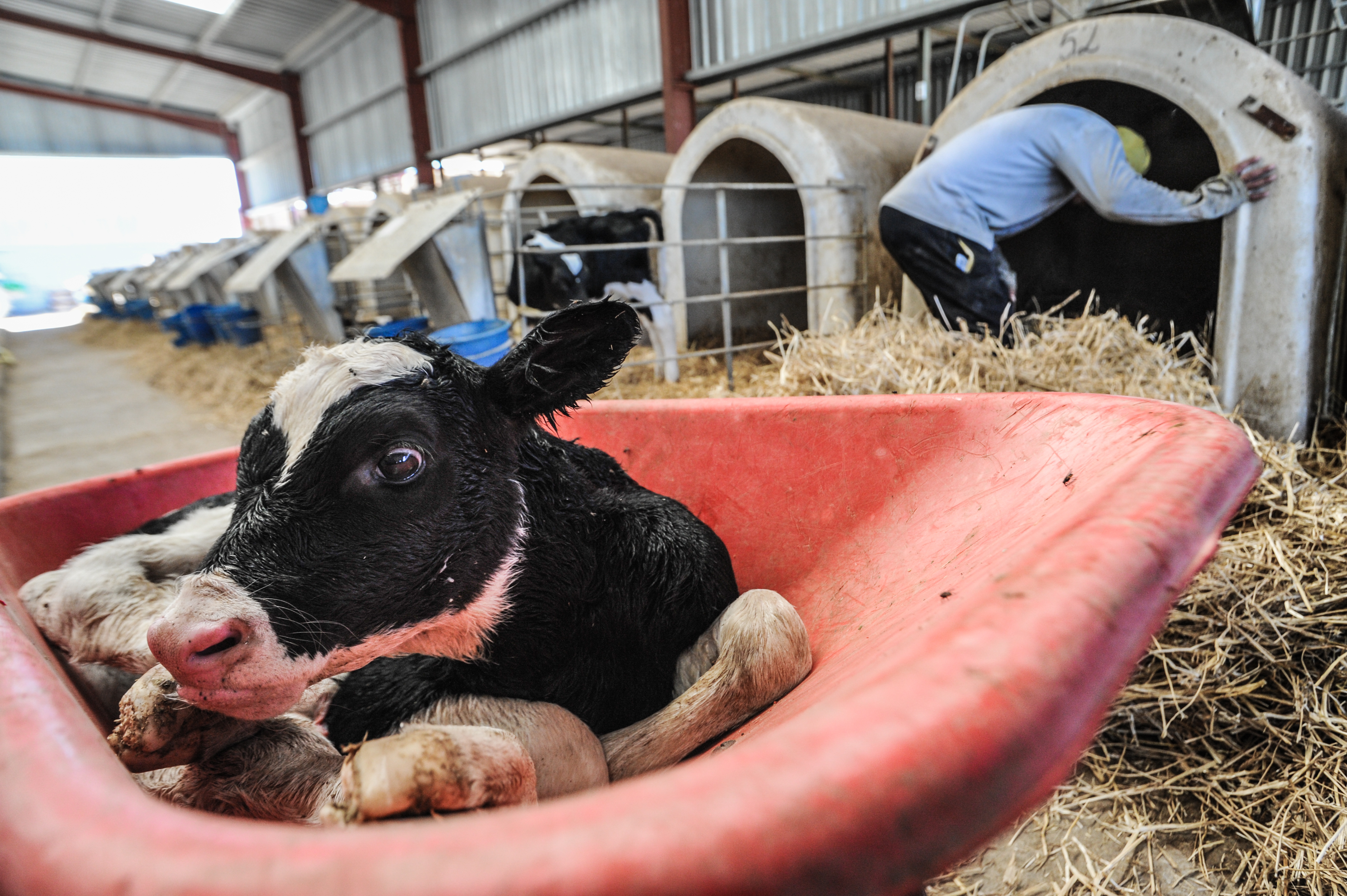
Still wet from birth, a calf is wheeled away from her mother to the veal crates at a dairy farm. Spain, 2010. – Jo-Anne McArthur
The standard practice in the dairy industry of removing, at or shortly after birth, vulnerable, newborn calves from their frantic mothers—whose milk is sold to humans—is just one example of the cruelty inherent in industrialized farming. Useless in dairy production, baby male calves are either killed at birth or raised for veal. These bovine infants are confined in small sheds and kept from moving or developing muscle to keep their flesh tender for human consumption. Calves fattened for veal experience only a few months of life; the severe abuse and deprivation they endure occurs solely for the sake of a few fleeting moments of gustatory consumer satisfaction. Desperate for maternal affection, nurture, and their mothers’ milk, newborn male calves are prevented from experiencing any of the divinely architected behaviours, sensations, or relationships that meet their needs and enable them to thrive as creatures beloved by God.
After a few years of repeated, forced impregnation, constant milking, and the trauma-inducing removal of their infants, dairy cows begin to produce less milk. These gentle creatures, who have a natural lifespan of up to 20 years, are sent to slaughter at age five or six, and sold as ground beef. Every year, hundreds of thousands of “downer cows”—dairy cows who can no longer stand as a consequence of years of confinement, artificially enhanced milk production, genetic manipulation, and other factors—are routinely pushed or dragged, while still alive, with forklifts or bulldozers. The heavy equipment and chains bruise, crush, and contort their bodies, causing extreme pain and suffering. The Scriptures exhort us to rescue animals who become trapped—in wells, for example—for the purpose of enabling them to live and thrive, not so they can be mercilessly tortured and then killed.
For the farmed animals who make it to slaughterhouses alive—millions in Canada and the U.S. die en route—a quick or painless death is not guaranteed. The pace of kill lines in industrialized meat plants is so fast that many animals are improperly stunned, and consequently face the “disassembly lines” while still fully conscious. A Washington Post exposé revealed countless incidents of botched slaughters at meat plants. Ramon Moreno, a worker at an IBP plant in the U.S., described his experience with these still-conscious animals: “They blink. They make noises. The head moves, the eyes are wide and looking around. They die piece by piece.” Martin Fuentes, a worker at the same plant, said that he had “seen thousands and thousands of cows go through the slaughter process alive.” Veterinarian and former hamburger plant inspector Lester Friedlander confirmed the frequency of the “mishaps,” stating that “in plants all over the United States, this happens on a daily basis.” “The degree to which we bend every aspect of (farmed animals’) existence to our convenience and profit,” writes philosophy professor Matthew Halteman, “raises the question of whether our dominion over them has become more about playing god than serving God.”
The call to repentance
We have ventured far from God’s original charge to us, in the first chapter of Genesis, to look after the earth and the animals in faithful stewardship. “Happy are you who sow beside all waters, who let the feet of the ox and the donkey range free,” says the prophet Isaiah (Isaiah. 32.20). By consuming its products, we keep afloat industrialized animal farming. The industry consigns animals to lives of relentless suffering, denying them even the most basic mercies of fresh air, sunlight, freedom of movement, and social relationships, and in so doing, transgresses both the letter and spirit of the Christian call to mercy, compassion, stewardship, and self-sacrificial living. Dominion, writes King in her book Animals Are Not Ours, is to be “exercised as God’s caring hand, not an iron fist.” Clough explains that “[w]e can’t live in perfect harmony this side of the new creation with other humans or our fellow animal creatures, but we can take responsibility for treating them with care and respect.” He continues, “Industrialized animal agriculture is clearly incompatible with that Christian responsibility.” Independent scholar Nekeisha Alayna Alexis asserts that we have no grounds on which to maintain that “other animals’ suffering is inconsequential when God institutes laws governing their treatment in the midst of establishing the new Hebrew community.”
The ills of industrialized animal farming affect humans, too, not just animals. Slaughterhouse and meatpacking workers—the majority of whom are people of colour, new or undocumented migrants, or on temporary foreign work visas—experience the highest rates of workplace injury of all manufacturing industries. They are three times more likely than the average worker to suffer serious injuries, including amputations, burns, and head trauma. At U.S. meat-processing plants, amputations stemming from workplace accidents occur at an average frequency of twice a week. COVID-19 has spread at catastrophic rates in meat plants, and meat plant workers face higher risks of diseases like lung cancer and hepatitis due to their elevated exposure to dangerous chemicals and pathogens. The psychological trauma sustained as a result of routinely treating sentient animals with violence is well documented. The brutality of the tasks actually drive meat plant workers to become more violent, even gratuitously so, toward both animals and other humans in their home communities. Many injuries and illnesses in the slaughter and meat-processing industry go unreported because the workers, many of whom have no other employment options, fear losing their jobs. For temporary foreign and undocumented workers with few vocational options, job loss can mean deportation. Industrialized animal agriculture severely afflicts not only farmed animals, but vulnerable and marginalized humans as well.
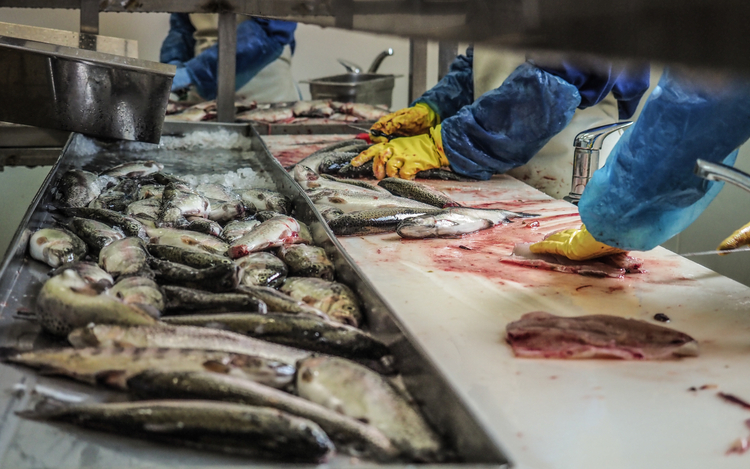
© Jo-Anne McArthur Workers dismember fish at a processing plant. Species include sea bass and sea bream as well as eel and rainbow trout. Photos taken on assignment for Ecostorm / Compassion In World Farming.
Professor of theological and social ethics, Charles Camosy, describes the consumption of factory-farmed animals as akin to “eating meat sacrificed to idols: the twin false gods of profit and consumerism.” To that duo of deities we could easily add a third: the “god of our stomachs,” indicted by the apostle Paul in his letter to the Philippians (Philippians 3.19). “God’s call to high dominion,” writes Halteman, “is fundamentally incompatible with cruelty to animals, indifference to their suffering, and the conceit that they are here for us to do with as we please.” The call to dominion is also incompatible with indifference to the plight of the humans in meat-processing plants who do the work that the rest of us cannot even bear to hear about, let alone perform ourselves. If the coronavirus pandemic is prompting a moral reckoning on our parts, then we need to ask ourselves whether we have sacrificed our commitment to righteousness on the altar of our appetites.
A century and a half ago, Cardinal John Henry Newman, referring to animals, stated in one of his sermons, “There is something so very dreadful, so Satanic, in tormenting those who never harmed us, who cannot defend themselves, who are utterly in our power.” We as consumers may be inflicting the harm indirectly, but to think that absolves us of moral responsibility is disingenuous. As Scully states, “The only thing worse than cruelty is delegated cruelty. It is colder than if I were doing it myself.” That we cannot even bear to watch footage of what goes on in the factory farms and slaughterhouse kill lines, let alone carry it out ourselves, should indicate that we should not be partaking of their fruit. “It is usually a sign of crimes against nature that we cannot bear to see them at all, that we recoil and hide our eyes,” Scully further asserts.
The abundance of whistleblower reports, video exposés, articles, books, and films released in the past two decades revealing the horrors endured by industrially farmed animals make it hard for us to claim ignorance. Even if one limits one’s reading and viewing to Christian-oriented media, documentaries, books, and online resources abound that detail the abject cruelty inherent in the industrialized system that produces almost all the meat, eggs, and dairy we consume, and how that cruelty constitutes a transgression of the Christian commitment to mercy and compassion. Oh for pastors who would call us to account!
If we have any legitimate defence for remaining unaware, it is that the animal agriculture industry has gone to great lengths to conceal what they do to animals to make milk and cheese and steak and eggs and chicken and bacon. This concealment has been devised precisely so that we may claim innocence and avoid pangs of conscience while indulging our appetites. In light of the plethora of revelations on this subject, though, might we not ask ourselves whether our persistence in eating the products of a brutal system is an effect of the very processes of hardening of heart and darkening of mind described in Paul’s letter to the Ephesians (Ephesians 4.17-20)? It is a question people of good faith must have the courage to consider. The Bible gives us a way of checking whether our hearts have grown hard. The first and perhaps most difficult step is to not only forgo turning a blind eye to the effects of our choices on farmed animals, but also to learn something of how those animals experience the systems to which we subject them. It took me two years to muster the courage to watch the documentary Earthlings. I watched it at home, alone, and paused the film repeatedly to sob and “rend my heart” (Joel 2.13) in grief—and repentance. This much shorter and less intense documentary introducing Christians to some of the issues caused by industrialized animal farming is perhaps a more palatable primer. Equipped with a basic understanding, we can then join the psalmist in praying, “Search me, O God, and know my heart! Try me and know my thoughts! And see if there be any grievous way in me” (Psalm 139.23-24). If we are sincere, and genuinely open to the conviction of the Holy Spirit, we may be confident of God’s prompting: “(W)hen one turns to the Lord, the veil is removed” (2 Corinthians 3.17). If the first commission to steward the earth and its creatures still applies, then is it too much to ask of ourselves to endeavour to avoid inflicting such egregious harm on farmed animals?
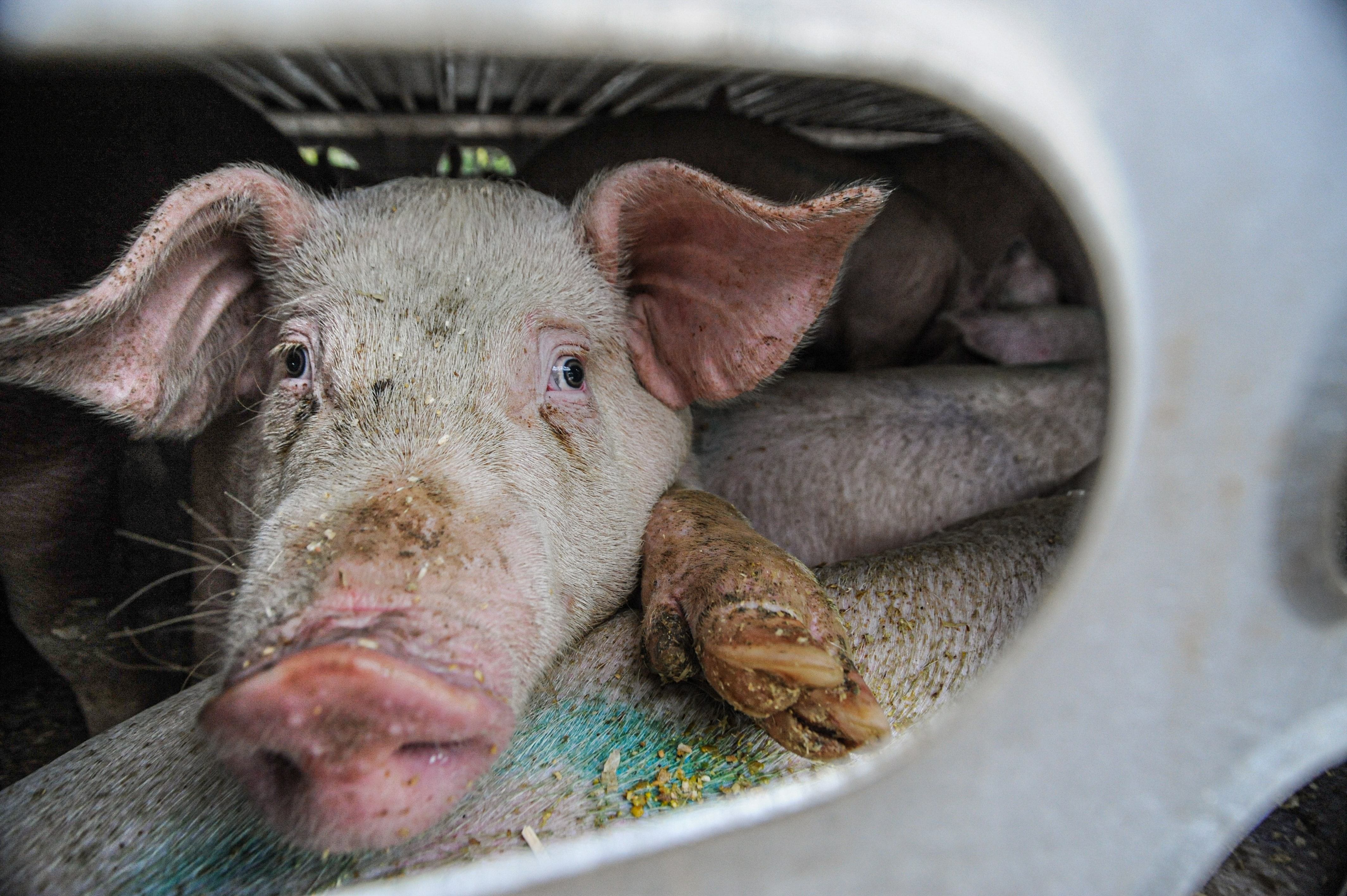
Crowded pigs are transported to a slaughterhouse – Jo-Anne McArthur
In a justified indictment of our continued disregard for the plight of intensively farmed animals, Scully writes that “it is a terrible thing that religious people today can be so indifferent to the cruelty of the farms, shrugging it off as so much secular, animal rights foolishness. They above all should hear the call to mercy. They above all should have some kindness to spare. They above all should be mindful of the little things, seeing in the suffering of these creatures, the same hand that has chosen all the foolish things of the world to confound the wise, and the weak things to confound the things which are strong.”
The relative handful of Christian voices in the wilderness who persist in “declaring to us our transgressions” (Isaiah 58.1)—that many of our food choices condemn billions of innocent creatures to lives of the most wretched torment—are faithful servants who deserve our thanks. “But exhort one another every day, as long as it is called ‘today,’ that none of you may be hardened by the deceitfulness of sin” (Hebrews 3.13). “Surprising as it may sound,” explains Halteman, “the simple question of what to eat can prompt us daily to answer God’s call to care for creation—to bear witness to the marginalization of the poor, the exploitation of the oppressed, the suffering of the innocent, and the degradation of the natural world, and to participate in the reconciliation of these ills through intentional acts of love, justice, mercy, and good stewardship.”
As the coronavirus pandemic persists in infecting millions and killing hundreds of thousands of people around the globe, the creation and its creatures “groan” under the burden of humanity’s sin (Romans 8.22) while they “wait with eager longing for the revealing of the sons of God” (Romans 8.19). If we are in earnest about revealing ourselves as God’s sons and daughters, then why not invite God to remove the veils that prevent us from extending mercy and regard to farmed animals, who are also beloved of God? “Is not this the fast that I choose,” asks the Lord, “to loose the bonds of wickedness, to undo the straps of the yoke, to let the oppressed go free, and to break every yoke?” (Isaiah 58.6). The imperative is especially on people of faith to broaden the aperture of their compassion and mercy to include animals, and the COVID pandemic is a perfect example of our failure to do so.
Lisa Warden, PhD, is an independent scholar affiliated with the Animals & Society Research Initiative at the University of Victoria and a Fellow at Sentient Media.


